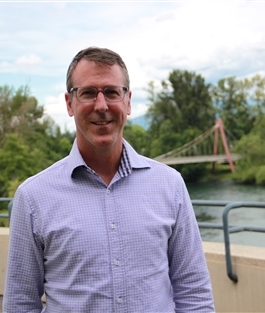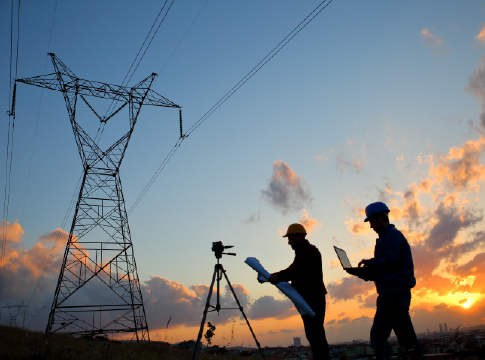Thank you for visiting EWEB's Climate Guidebook! The Climate Guidebook is a reference document to articulate how EWEB is addressing climate change throughout the utility. It is meant to be perused like an encyclopedia. Read on for a summary, download the entire Guidebook, or view a web-based version.
Read the Climate Guidebook
EWEB's Climate Guidebook v3.0 is an in-depth, extensive reference document that seeks to serve the needs of a variety of internal audiences (EWEB staff) and external audiences (customer-owners and community members). To make the information as accessible as possible, the report is available in multiple formats.
NEW!! - Download the full Guidebook in PDF form (v3.0)

A Message from EWEB's General Manager Frank Lawson
EWEB recognizes that climate change presents significant challenges and opportunities, and is changing our physical, political, and social landscapes. Already, we’re seeing more frequent and extreme heat waves, prolonged droughts, reduced snowpack, and more frequent and severe fires. This matches projections for Lane County, according to the Oregon Climate Change Institute (PDF). Legislation, regulations, and customer expectations are also being modified in response to climate change. To adapt to this changing landscape, the energy sector must take steps to reduce emissions of planet-warming greenhouse gases (GHGs). At EWEB, we believe that taking these actions is imperative.
In January 2022, EWEB’s Board of Commissioners revised Climate Change Policy SD15 (PDF), defining our commitment to reducing emissions associated with both the energy we provide and our operations. In 2023, the Board provided further guidance by developing and adopting both a Resiliency Policy (SD22) and Diversity, Equity, and Inclusion Policy (SD23). To guide our progress and share it with the community, we created this Climate Guidebook and are pleased to share our third major update in v3.0 here. Annually, we update the Guidebook with new information about our initiatives and our progress.
In Oregon, electricity is the second largest source (PDF) of greenhouse gas emissions, after transportation. And as electricity needs grow because of the electrification of transportation, the actions of electric utilities such as EWEB will only become more important.
Our commitment to addressing climate change is built on five pillars: climate policy, power supply and transmission, customer decarbonization, EWEB-owned asset resiliency, and internal operations. These five pillars each make up a chapter in the Climate Guidebook.
- Climate policy: EWEB will participate in local, state, and regional efforts to encourage, develop, and enact measures to minimize and mitigate greenhouse gas emissions.
- Power supply and transmission: EWEB has committed to sourcing a low-carbon electric power portfolio that targets over 95% of annual energy from carbon-free resources by 2030, on a planning basis. Our energy is already approximately 90% carbon free.
- Customer decarbonization: EWEB has pledged to assist customers with achieving their GHG emission reduction goals. We do this by helping customers with energy efficiency, alternative fuels, electric and water conservation, and many other programs.
- EWEB-owned asset resiliency: EWEB is committed to providing essential Electric and Water Services to the community. To limit the likelihood, magnitude, and duration of disruptive events including those that develop over time—EWEB is dedicated to implementing a comprehensive resiliency program.
- Internal operations: EWEB has promised to mitigate GHG emissions from EWEB’s operations by achieving carbon neutrality by 2050. We will meet other intermediate benchmarks along the way.
The guidebook will serve as an ongoing comprehensive reference document for EWEB staff as well as community stakeholders who care about EWEB’s climate programs and progress. By compiling all relevant information about EWEB’s climate work and impacts in one location that is easy to access, we can raise community awareness about EWEB’s progress and role as an environmental steward.
Thank you for browsing this Guidebook. We look forward to partnering with our community to fulfill our mission and live our values.
Frank Lawson
CEO/General Manager
Acknowledgements
EWEB believes in a triple bottom line approach to sustainability that includes the economy, social impacts and equity, and the environment. EWEB’s sustainability journey has been long, and it is expected to continue for years to come, building on a culture of continuous improvement as we learn and find new ways to apply that learning. The Climate Guidebook is an output of EWEB’s sustainability efforts, focused on the ways the work of the utility intersects with climate issues.
Staff from many departments across the utility have contributed to the creation of this document and will be involved in providing future updates. Sincere thanks go out to all EWEB staff for their engagement in this process. Thanks also to YOU, the reader, for making the Climate Guidebook and its goal of providing useful information to a diverse set of audiences, into a reality.
For questions about the Climate Guidebook, to request new content, or if you have suggestions for future changes, please contact:
Kelly Hoell (she/her)
Climate Policy Analyst & Advisor
Kelly.hoell@eweb.org
Direct: 541-685-7379
Related Programs
EWEB’s Integrated Resource Plan (IRP) will analyze possible energy resource portfolios with a goal of creating useful insights for long-term (20-year) electricity supply planning decisions.



